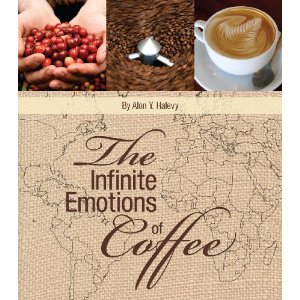 Alon Halevy‘s labor of love for the past few years – in addition to leading Google’s database research group – has been researching and writing a book on coffee.
Alon Halevy‘s labor of love for the past few years – in addition to leading Google’s database research group – has been researching and writing a book on coffee.
The book – The Infinite Emotions of Coffee – has launched! Discover it, and order it, here.
(Alon was a UW CSE faculty member for many years before joining Google when they acquired one of his startups. He is now an Affiliate Professor.) Read more →
 KING5 news reports on UW CSE’s StopFinder, a public transit app that talks to the blind, bringing the features of UW CSE’s OneBusAway transit app to a new community of users.
KING5 news reports on UW CSE’s StopFinder, a public transit app that talks to the blind, bringing the features of UW CSE’s OneBusAway transit app to a new community of users.
“OneBusAway became one of the most popular mobile apps in the Seattle area in the last couple of years, providing easy access to maps, schedules and real-time updates on when a bus will arrive at a particular stop …
“A University of Washington student developed OneBusAway. Now students and researchers at UW’s Department of Computer Science & Engineering are building a transit app that talks to the blind, telling them where a stop is located and what they can expect to find when they get there.”
Check out the KING5 story here. Read about the research here. Learn about OneBusAway here. Read more →
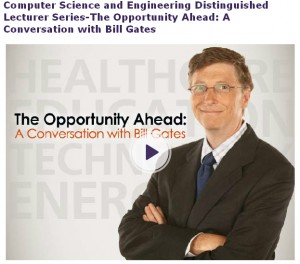 GeekWire highlights UWTV’s broadcast and web archive of Bill Gates’s Distinguished Lecture in UW CSE:
GeekWire highlights UWTV’s broadcast and web archive of Bill Gates’s Distinguished Lecture in UW CSE:
“This is Bill Gates, coming full circle.
“During a rare appearance last month on the University of Washington campus — where he snuck into buildings with his boyhood friend Paul Allen to learn how to program — the Microsoft co-founder talked about the evolution of computer science and explained how the latest advances in technology are fueling the work of his foundation and its partners in global health and education.
“The discussion, led by UW computer science professor Ed Lazowska, was followed by an illuminating Q&A session in which students quizzed Gates on topics such as health care, politics, education and the realities of life as a billionaire.”
More here. Read more →
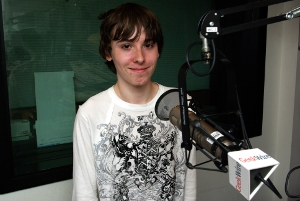 “Of all the stories we covered on GeekWire in 2011, one of the most remarkable was the tale of Daniil Kulchenko, a high school sophomore from Kenmore, Wash., who sold his first startup this year at the ripe old age of 15.”
“Of all the stories we covered on GeekWire in 2011, one of the most remarkable was the tale of Daniil Kulchenko, a high school sophomore from Kenmore, Wash., who sold his first startup this year at the ripe old age of 15.”
Daniil is the son of UW CSE Ph.D. student Paul Kulchenko.
Read more here and here. Read more →
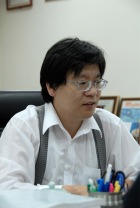 Jason Yi-Bing Lin, a 1990 Ph.D. alumnus of UW CSE, has been recognized with the 2011 Prize in Engineering Sciences from TWAS, the academy of sciences for the developing world.
Jason Yi-Bing Lin, a 1990 Ph.D. alumnus of UW CSE, has been recognized with the 2011 Prize in Engineering Sciences from TWAS, the academy of sciences for the developing world.
Jason is Dean of the College of Computer Science, lifetime Chair Professor, and Vice President of the National Chiao Tung University, Taiwan. He has been widely recognized for his many contributions to wireless communication, including (among many other honors) being named a Fellow of the Association for Computing Machinery, a Fellow of the Institute of Electrical and Electronics Engineers, and a Fellow of the American Association for the Advancement of Science. He is the author of three textbooks: Wireless and Mobile Network Architecture (co-author with Imrich Chlamtac, 2001), Wireless and Mobile All-IP Networks (2005), and Charging for Mobile All-IP Telecommunications (2008).
Congratulations Jason! Read more →
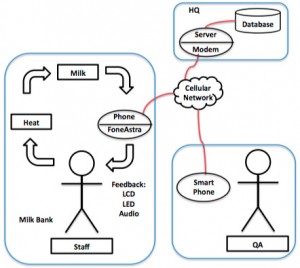 PATH, a global health non-profit headquartered in Seattle, announces a joint project with UW CSE funded by the Bill & Melinda Gates Foundation to develop a safety monitoring system for human breast milk, based on UW CSE’s FoneAstra technology.
PATH, a global health non-profit headquartered in Seattle, announces a joint project with UW CSE funded by the Bill & Melinda Gates Foundation to develop a safety monitoring system for human breast milk, based on UW CSE’s FoneAstra technology.
“Flash-heating is a simple, effective way to pasteurize breast milk that is more affordable for human milk banks in low-resource settings than standard commercial-grade pasteurization. The total cost for the monitoring system will be less than US$100, compared to commercial-grade pasteurizers, which cost up to $12,000.”
Read the PATH press release here. Read more →
 “In June, Oren Etzioni, the brains behind airline price predictor Farecast, brought forth Decide.com, a Web site that predicted the future prices of laptops, cameras and televisions. With a Wait or Buy signal, it gave you the probability prices would change or that a new model was coming …
“In June, Oren Etzioni, the brains behind airline price predictor Farecast, brought forth Decide.com, a Web site that predicted the future prices of laptops, cameras and televisions. With a Wait or Buy signal, it gave you the probability prices would change or that a new model was coming …
“The company, based in Seattle where Mr. Etzioni teaches computer science at the University of Washington, now predicts prices for 30 other electronics categories including camera lenses, computer games, tablets and e-readers, headphones and audio equipment. The company makes billions of price observations from across the web and uses artificial intelligence to discern a pattern and predict a price.”
Read more here. Read more →
 At the encouragement of UW CSE’s Shwetak Patel, TechFlash added a “Youth of the Year” category to their annual “Flashies” recognition.
At the encouragement of UW CSE’s Shwetak Patel, TechFlash added a “Youth of the Year” category to their annual “Flashies” recognition.
Two of the four 2011 nominees have UW CSE connections. Akash Badshah worked in Shwetak’s lab. Daniil Kulchenko is the son of UW CSE graduate student Paul Kulchenko.
Vote for a UW CSE nominee for the TechFlash “Youth of the Year” here! Read more →
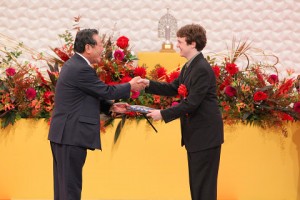 Refraction, a game created by UW CSE’s Center for Game Science to teach fractions to elementary school students, has been honored with The Ministerof Education, Culture, Sports, Science and Technology Prize for the BestWork in the Primary Category in the 38th NHK Japan Prize, an international competition for educational media.
Refraction, a game created by UW CSE’s Center for Game Science to teach fractions to elementary school students, has been honored with The Ministerof Education, Culture, Sports, Science and Technology Prize for the BestWork in the Primary Category in the 38th NHK Japan Prize, an international competition for educational media.
Refraction placed 1st among the 60 entries in the Primary category, competing with major international broadcasting organizations such as PBS, NHK, Sesame Street, and the National Film Board of Canada.
UW CSE Ph.D. student Erik Andersen was flown to Tokyo by NHK to receive the prize.
Congratulations to Erik and the Refractions team!
Read more →
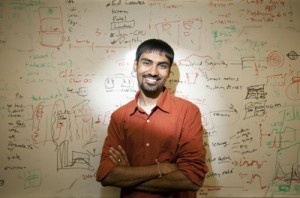 A nicely done article on Shwetak Patel’s MacArthur Fellowship.
A nicely done article on Shwetak Patel’s MacArthur Fellowship.
“Patel earned this award for his innovative work with a series of sensor-technology systems, specifically for the home. These low-cost, user-friendly sensors can be used to monitor electricity and water consumption, broken down to the individual fixture and appliance simply by plugging one into the wall. Users can see which areas of the home are responsible for the highest percentage of use, allowing them to specifically target those gadgets and conserve water and energy more effectively.”
Read more here. Read more →
 Alon Halevy‘s labor of love for the past few years – in addition to leading Google’s database research group – has been researching and writing a book on coffee.
Alon Halevy‘s labor of love for the past few years – in addition to leading Google’s database research group – has been researching and writing a book on coffee.









